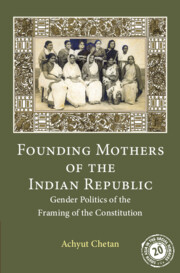Book contents
- Frontmatter
- Dedication
- Contents
- List of Images
- Preface
- Acknowledgements
- List of Abbreviations
- Introduction: Towards a Feminist Reading of the Making of the Constitution
- 1 In the Shadow of the Founding Fathers
- 2 In Search of the Missing Mothers
- 3 Women’s Moral Imaginary and Constitutional Politics: 1927–1946
- 4 Patterns of Participation: Women Members in the Constituent Assembly
- 5 Writing the Rights: Inscribing Constitutional Morality
- 6 Reformulating the ‘Woman Question’: Challenging Customs and Traditions
- 7 After the Framing
- Conclusion: Remembering the Founding Mothers
- Appendix: Texts and Contexts of the Framing – A Timeline
- Bibliography
- Index
Preface
Published online by Cambridge University Press: 27 September 2022
- Frontmatter
- Dedication
- Contents
- List of Images
- Preface
- Acknowledgements
- List of Abbreviations
- Introduction: Towards a Feminist Reading of the Making of the Constitution
- 1 In the Shadow of the Founding Fathers
- 2 In Search of the Missing Mothers
- 3 Women’s Moral Imaginary and Constitutional Politics: 1927–1946
- 4 Patterns of Participation: Women Members in the Constituent Assembly
- 5 Writing the Rights: Inscribing Constitutional Morality
- 6 Reformulating the ‘Woman Question’: Challenging Customs and Traditions
- 7 After the Framing
- Conclusion: Remembering the Founding Mothers
- Appendix: Texts and Contexts of the Framing – A Timeline
- Bibliography
- Index
Summary
This book has long been in search of an author and it seems worth sharing with my readers how I stepped into that role. It was the summer of 2005. After my final university exams I had returned to my isolated hometown in Jharkhand – a town that had yet not arrived on the railway map of India – whose growing squalor was encircled by the heart-stopping beauty of a river passing through ancient hills and dense forests. It was here that my father, a bibliophile and an old-school lawyer had painstakingly built over years, a sprawling house. The pride of place was a large airy library, which, given his slender fortunes, was incredibly well-stocked. This was the library that had inculcated in me a curiosity about the world. So, I grew up reading not only story books but also encyclopedias and dictionaries, biographies and histories. It was here that I had encountered as a child the 13 volumes of the Constituent Assembly Debates, well-thumbed and underlined in pencil by my father. Little did I know at that age that these volumes would become indispensable for my research and I would pour over them, train my eyes to read their densely printed pages, and sometimes feel exasperated at the volubility of the participants of the Constituent Assembly – they had so much to say. But that was much later, and I must not run ahead of my story and return to the moment when it all began.
One evening we sat in the library and read in companionable silence till my father shut the volume he was reading, rubbed his tired eyes, and asked me what I knew of the women members of the Constituent Assembly? His reason for asking me this question, I realized later, was because I often spoke of feminism, of women activists, writers, and historians – issues that preoccupied me in those days. But his question took me by surprise. I had never heard or read about women participating in the debates of the Constituent Assembly. All the discussions revolved around the ‘Founding Fathers’ of the Constitution, a group of powerful male politicians like Jawaharlal Nehru, Vallabhbhai Patel, Rajendra Prasad, and of course, B.R. Ambedkar.
- Type
- Chapter
- Information
- Founding Mothers of the Indian RepublicGender Politics of the Framing of the Constitution, pp. xv - xxPublisher: Cambridge University PressPrint publication year: 2023

